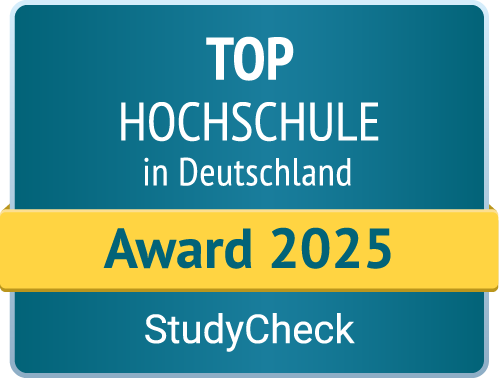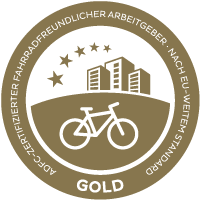Alumni interviews
Luisa Filip

What was the best experience at Ansbach University that you remember?
The last university party, where all my friends were still there and we enjoyed the evening together again, hugging each other to our favourite songs and at the same time knowing that we will soon be going in completely different directions.
You can't have studied in Ansbach without...
...seen a bunny on campus.
What motivations determined your choice of studies and career?
It was important for me to find a job in which I can realise myself and my talents, but which is also meaningful and with which I have the feeling that I can make a difference in society.
What influence did your studies at Ansbach University of Applied Sciences have on your life? Is there anything that has remained particularly memorable for you?
My MIK year consisted of exactly three women. We had quite special individual treatment, so to speak, and the lecturers were able to engage with us very intensively, which was very valuable. For me, the MIK Master was the perfect preparation for my professional life. I learned the journalistic craft and became better at producing radio plays, but I was able to improve my soft skills with the Master's programme: How do I speak charismatically in front of people? How do I organise an event or lead a group? What do I actually want to achieve in life and where do I want to be in 20 years? Where are my strengths and how can I use them for my professional goals? That's what made the Master's programme so unique and special for me.
What could you take away from your studies for your professional future?
A lot. I produced a podcast as my master's thesis and learned so much that I was able to start directly in the podcast world after my master's thesis. There was also a seminar where we had to speak in front of the camera. The feedback there was very valuable for me and contributed enormously to the fact that two years later I was able to pass the entrance exam at the Institute for Moderation in Stuttgart and am now a trained moderator. In a seminar, I was allowed to practise as editor-in-chief for an online portal what it means to lead a group and have to make journalistic-editorial decisions.
If you could study again today, would you do anything differently?
I found a philosophical Bachelor's degree with a focus on history and media studies and a practical Master's degree a great mix. So in that respect, no. Basically, I would put less pressure on myself today. But that's always so easy to say afterwards, and even if I had known at the time, I probably would have done it. It was probably part of the development process for me.
Looking back on your time as a student: What would you like to pass on to the students?
Take everything with you that you can. And by that I don't necessarily mean all the parties (which are also important), but all the opportunities that allow you to look beyond the horizon of your own degree programme or that are not compulsory. For example, I find stays abroad very beneficial. Getting involved in groups at the university is always a good thing.
And to try things out and also admit that if your degree programme isn't leading you in the right direction, you might want to take a different path.
To what extent do you still feel connected to the university today? Do you still have contact with fellow students?
I'm still in contact with the university itself through the great Pixel Campus project, and I'm allowed to give my voice to audio and video projects from time to time. I still have regular contact with my fellow students, and I even work with some of them on projects from time to time.
What were important stages in your career?
- My job shadowing at DLF Nova (2019), which led to my regular work there today as an editor and writer.
- My first big podcast project (2020) for the nutritional podcast of a large German supermarket chain, produced by Podstars by OMR. I learned an insane amount there and many follow-up jobs have come out of it.
- My training as a moderator at the Stuttgart Media University (2021).
And basically all the moments when I "failed". I put that in inverted commas because that's what society calls it when you get a rejection or aren't accepted for entrance exams. For me, however, it was never a real failure when I got rejections after entrance exams or castings, but simply another important experience that shaped me, that showed me where my values and priorities lie. And it helped me internalise a mantra: If I get a rejection, the exam board never decided AGAINST me, but only FOR another person. That's important so that you don't lose heart.
What do you particularly like about your job today?
That it is so versatile. I get to work on stage and in the recording studio, I'm at my laptop or outside with people. I also learn a lot because I get to look into so many different topics and realities of other people's lives. And with some of my projects, like the podcast X and Y - about media and feminism, I feel like I can really make a difference, really make people think, and that's a very valuable feeling.
What are the three most important skills in your everyday work?
- Time management: Without proper time management, my projects, which all start and end at different times, would not be feasible.
- Flexibility of mind: In my job, I have to get to grips with super different topics very quickly. One week I'm researching the effects of the moon on our bodies, the next week I'm researching the French Constitution of 1793, and at the same time I'm working on a moderation on mental health. You need focus, but above all flexible thinking.
- Networking: Without networking, I would never be where I am now. It's an incredibly important skill that you can't underestimate - whether online or at live events.
- In your opinion, how do you make a good career start in your industry (entry routes, application tips)?
- Internships are important, (although unfortunately not always easy to get and not well paid) on the one hand you can see what the job is like, but also the potential employers get a much better impression of you than in a half-hour job interview.
- Look for a USP - what is my speciality, where do I know my way around, what special knowledge can I offer? What topics do I want my name to be associated with - you should think about this carefully beforehand and then also
What career tips do you have for students and young graduates?
Networking is everything and stick to your goal! Even if it doesn't work out 20 times, it will work out the 21st time.
Persons

Laura Müller
Leiterin Bereich Beratung
0981 4877-574 54.0.7 nach Vereinbarung laurakristin.mueller vCard
Laura Müller

Leiterin Bereich Beratung
Funktionen:
Leiterin Bereich Beratung

Louisa Späth
Mitarbeiterin Bereich Beratung: Alumnimanagerin
0981 4877-133 54.0.6 nach Vereinbarung louisa.spaeth vCard
Louisa Späth

Mitarbeiterin Bereich Beratung: Alumnimanagerin
Funktionen:
Mitarbeiterin Bereich Beratung:
Alumnimanagerin

Dunja Zöller, M.Sc.
Mitarbeiterin Bereich Beratung: Alumni
+49 (0)162 2085083 54.0.6 nach Vereinbarung dunja.zoeller vCard
Dunja Zöller, M.Sc.

Mitarbeiterin Bereich Beratung: Alumni
Funktionen:
- Mitarbeiterin Bereich Beratung / Büro für Familie, Chancengleichheit und Diversity
- Antidiskriminierungsbeauftragte
- Gleichstellungsbeauftragte
© 2025 Hochschule Ansbach


